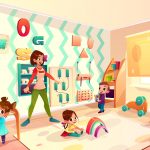Understanding Lisping in Children
Lisping – a speech disorder that parents are terrified of. No one wants their child to get this disorder. So, what is lisping? It is a speech disorder wherein the child is unable to pronounce the ‘s, z, she, l, r, and ch’ sounds. It is predominantly seen in children below 5 years of age.
Let us discuss what is lisping. It is a speech impediment that is found in children where they are unable to produce the sounds associated with certain consonants, especially S and Z. In some cases, Sh, L, R, and Ch also create a different sound than usual. It is usually developed during childhood and often goes away on its own, though some may require treatment. A child suffering from a lisp may sound different than his peers which may lead to shame or frustration over a period of time, if not treated timely. But dealing with a lisp in a fun way can help correct the speech disorder in your child.
Types of lisp
There are four types of lisps:
- Frontal Lisp: It occurs when the child pushes his tongue far too forward making the ‘th’ sound instead of the ‘s’ or ‘z’ sound.
- Lateral Lisp: It occurs when excess air slides over the child’s tongue making the S and Z sound as if there is extra saliva in the mouth.
- Palatal Lisp: It occurs when the mid portion of the tongue touches the palate while making the ‘s’ or ‘z’ sound.
- Dental Lisp: It occurs when the child curls the tongue and pushes it against the front teeth, again making the ‘th’ sound instead of the ‘s’ or ‘z’ sound.
What causes a lisp
There are no known causes of lisp as every child is different. Here are some of the possible reasons that contribute to what causes a lisp.
- Excessive sucking of the thumb is a common cause seen in many children.
- Overusing pacifiers.
- The irregularities of the tongue’s structure restrict its movement. It is also known as ‘tongue tie’ or ankyloglossia.
- Jaw alignment problems.
- Learning the incorrect sound by imitating others.
- Prolonged respiratory illness. A stuffy nose leads to mouth breathing causing problems in the correct pronunciation.
When can lisping be a concern:
Lisping is a common speech impediment. Many children suffer from some kind of lisp and it is normal if it occurs up to the age of 5 years. Children, sometimes, tend to talk rapidly or repeat words and phrases, or even lisp when they are too excited to express themselves. It is advisable to observe the child and remind him from time to time about the correct pronunciation.
The majority of children outgrow this habit and the lisp goes away on its own. If it persists beyond 8 years then it is time to have a consultation with a speech therapist. With the correct guidance, the child will learn to pronounce the sounds correctly. But whenever parents hear their child lisp – even if it is for the first time- they immediately think of how to fix the lisp, which is quite natural to think.
How to fix a lisp:
There are speech therapists and language pathologists who help people, especially children, who suffer from lisp. They evaluate what kind of lisp the child has and then decide on a course of action to be followed over the period of time. This may take anywhere between a few months to a few years, depending on the severity of the lisp and how the child responds to the given treatment. If the child has ankyloglossia then a simple procedure can help reduce the lisp.
Apart from these, as a family, there are certain things that would help a child who is lisping.
- Understand what your child is going through and make efforts to help him. Have patience and do not show anger or irritation when the child is unable to produce the desired sounds.
- Do not mock the child as this will affect his self-esteem. Check if your child is being bullied due to this defect. In such cases you need to stand strong along with your child. Try and teach your child how to handle the situation.
- You yourself can start to break the words into smaller fragments and ask your child to repeat them.
- Make sure that you talk to your child’s teacher and request some special attention while your child is at school.
Additionally, you may do the following things as precautionary measures:
- Encourage your child to drink water from a cup or straw instead of a bottle.
- Bring down the use of the pacifier.
- Try and break the habit of thumb-sucking from an early age.
- Check for teeth alignment from time to time and seek professional help if you think something is wrong or are unsure.
We understand that no parent wants their child to have any kind of speech defect and timely action always helps. If you think that you should consult the doctor as soon as you hear the lisp then probably that is the best. After all, nothing beats a parent’s gut feeling!
To work on your child’s vocabulary and articulation from the beginning you can get more information on EuroKids.















